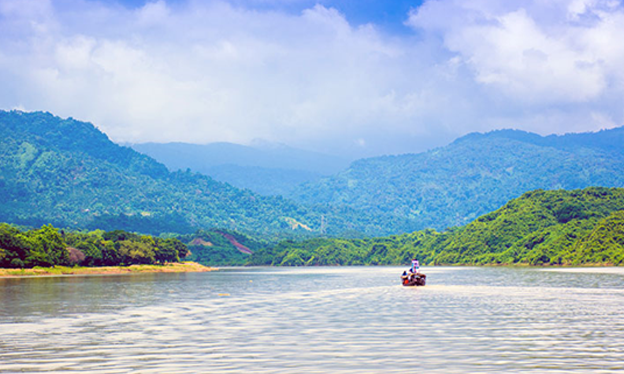The Khasia-Jainta Hill can be found in the northeastern border region of Bangladesh, specifically in the Kanaighat Upazila of Sylhet. The hill has several sandy rivers with pure water flowing at its base, including the Lobachhara River and the Lova River, which boasts verdant hills and amazingly clear water. Visitors who experience the beauty of these rivers will surely want to return. The Lobhachhara tea garden also features numerous ancient suspension bridges that add to the area’s charm.
India’s hilly state of Meghalaya is not far from Lovachara. If you climb any high mountain
The Khasia Jaintia Hills of Meghalaya is located nearby. Lovachara Garden, a wildlife sanctuary and tea garden, is home to deer, hares, and forest roosters that can be seen in the early morning. The garden is also home to several domestic elephants that roam freely throughout. While tourists have no accommodations, plantation owners can access four lovely bungalows. Thousands of labourers remove stones daily from the Lova River, which flows by Lovachhara Garden. These stones and sand are distributed to various regions of the country.
This region has various attractions such as tea gardens, natural lakes and springs, sanctuaries of Miraping Shahr, antiquities of Mughal kings and queens, ancient dig sites, stone quarries, and social forestry of the forest department. You won’t believe how quickly time will pass as you explore these sights. One of the most captivating structures in Lovachora is the hanging bridge, also known as the ‘Latkonir Pool’ by locals. This suspension bridge was built during the British era and can be found on the road to Lovachara.
The bridge to Lovachora was constructed by the British in 1925, and it’s a delightful experience to stand on it and appreciate the unique beauty of Lovachora. On the east side of Moolagul Bazar, on the south side of Lobhachra, there’s a hill where Oli Hazrat Miraping Shah (R.A.), one of the 360 Auliyas who was Hazrat Shahjalal’s (R.A.) companion, has a shrine. Every day, many devotees visit this shrine, and the area surrounding it is filled with the purity of their affection.
There are many antiquities of Mughal kings and queens on the Lovachara border. At the foot of a hill called Chokhatila are two ancient stones next to a spring. The kings and queens used to sit on these two stones to play.
There is a huge pond next to the tea garden. Once upon a time, many miraculous things, such as dishes, silver coins etc., floated in the water of Dighi. Along the eastern side of the Surma River lies a vast stone quarry known as the Lova Stone Quarry. Every day thousands of workers extract stones from here. The stone extracted from here is supplied all over the country. of here
As you travel towards the quarry, you’ll be greeted with breathtaking views of stunning landscapes. Once you’re on board the boat, Banani’s mountains, gardens, and greenery will captivate your senses. If you opt for a canoe ride, you can see the riverbed through the crystal-clear water.
When will you go to Lovachara?
You can travel freely in any season. But the entire lush green Lobachhra tea garden takes on a magnificent appearance in the monsoons. So jumping into the green chest of Lovachora on a rainy day will win the hearts of tourists.
Sylhet by bus:
Buses from Dhaka to Sylhet depart from Gabtali and Syedabad Bus Terminals regularly from morning to 12.45 pm. Sylhet buses depart from Fakirapool, Syedabad and Mohakhali bus stations in Dhaka. A.C. buses of Green Line Transport, Saudia S Alam Transport, Shyamli Transport and Ena Transport operate on this route. Rent 800 to 1 thousand 100 takas. Besides, non-A.C. buses of Shyamoli Paribahan, Hanif Enterprise, Unique Service, and Ena Paribahan go to Sylhet. Rent 400 to 450 taka Ena Paribahan buses leave from Mohakhali and go to Sylhet via Tongi Ghorashal.
Dhaka to Sylhet by train
It leaves Dhaka’s Kamalapur Railway Station at 6:40 am every day of the week except Tuesday. Intercity Train Parabat Express. Jayantika Express departs at 2 pm on weekdays, and Upaban Express departs at 09:50 pm except Wednesdays. Kalani Express leaves at 4 pm every day except Friday. Rent from 150 to 1 thousand 18 takas. If you go by train, it is best to take the Upaban Express at 9.50 pm. Because it will be morning as you go.

